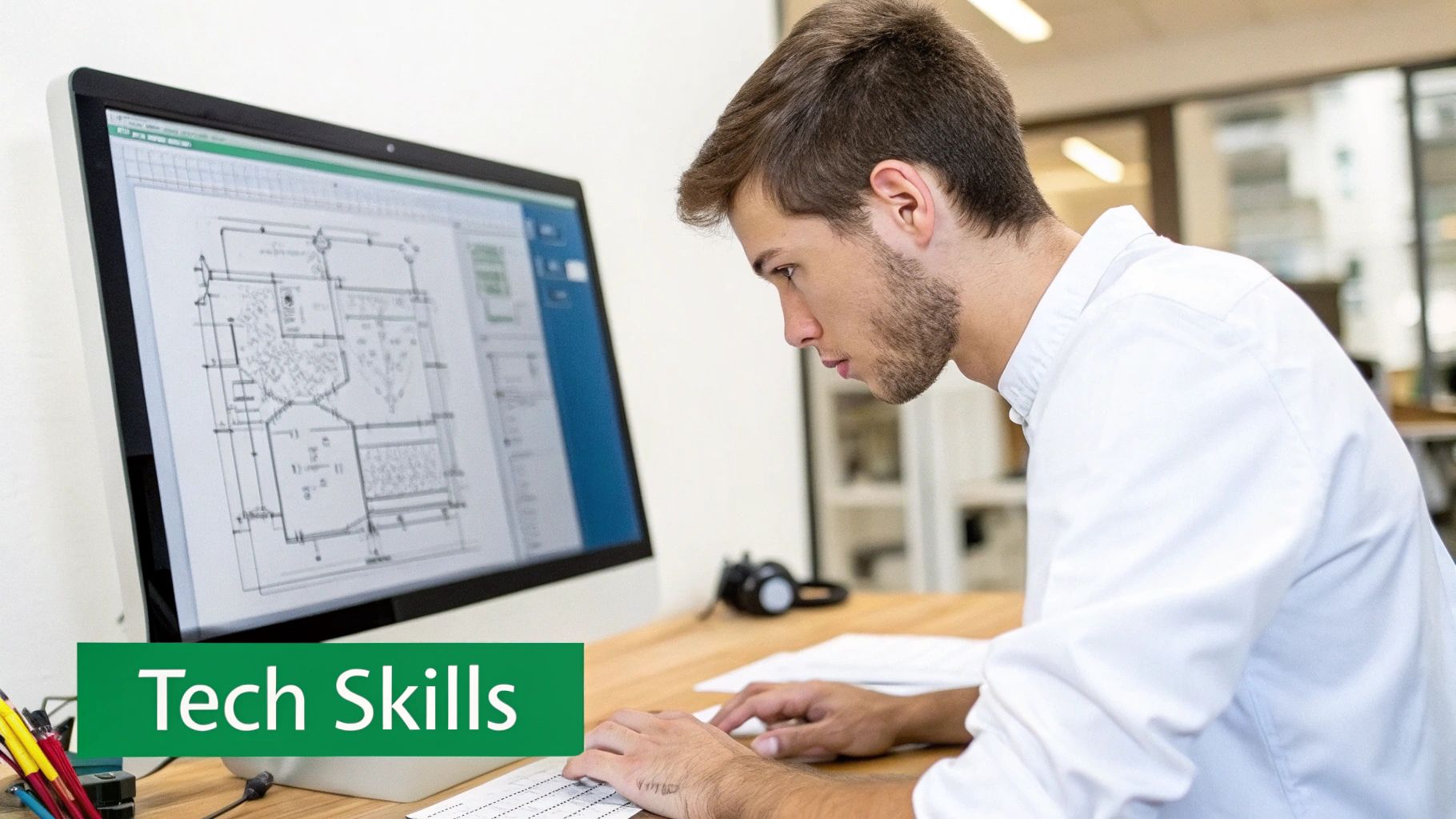Why Finding a Technical Cofounder Makes or Breaks Startups

Starting a tech-focused company without a technical cofounder can be incredibly challenging. The initial thrill of a new idea can quickly fade when faced with the realities of building a functional product. Securing the right technical cofounder is more than just finding someone to write code; it's about gaining a partner who can help steer your startup towards success.
The Power of Balanced Leadership
A strong technical cofounder provides the crucial technical expertise needed to bring a non-technical founder’s vision to life. This balance in leadership is vital. The non-technical founder might excel in areas like market research and marketing, while the technical cofounder focuses on building a scalable and user-friendly product.
This collaborative approach also strengthens decision-making. By incorporating different perspectives, the founding team can more effectively navigate the inevitable complexities of building a startup. This balanced approach often results in a more resilient and adaptable company.
Finding a capable technical cofounder is no easy feat. Research from Indie Hackers indicates that 78% of founders looking for cofounders specifically sought technical partners. This statistic underscores the high demand for individuals with the skills to translate ideas into tangible products.
From Struggling Ideas to Thriving Businesses
Many successful startups attribute their growth to the presence of a skilled technical cofounder. These partnerships frequently transform struggling concepts into flourishing businesses. A technically proficient cofounder can bring even seemingly impossible ideas to fruition.
Moreover, a technical cofounder can drastically shorten development timelines. Their understanding of technology enables faster iteration and more effective problem-solving. This accelerated pace is often critical in the competitive startup environment.
Challenges for Solo Non-Technical Founders
Non-technical founders who choose to go it alone often face significant obstacles. They may struggle to translate their vision into a working product, leading to delays, escalating costs, and a less competitive offering.
Outsourcing technical development, while an option, can be expensive and may not foster the same level of commitment and ownership as a dedicated cofounder. This can restrict long-term growth and ultimately limit the startup's potential.
Finding a technical cofounder isn't just about addressing a skills gap; it's about laying the foundation for lasting success. This partnership provides far more than code; it contributes essential leadership, accelerates development, and significantly increases the likelihood of achieving your startup's objectives.
Becoming the Partner Technical Talent Actually Wants

Attracting a skilled technical co-founder takes more than just a compelling idea. You need to present yourself as a valuable partner, someone who brings more to the table than just the initial concept. This shift in perspective is key to attracting the best technical minds to your project.
Demonstrating Value Beyond the Idea
Successful non-technical founders understand the importance of showcasing their individual strengths. This means going beyond simply having a "good idea." Focus on demonstrating tangible skills and experiences that complement technical expertise.
Are you a marketing expert who can build early momentum? Do you possess strong financial management skills to ensure responsible resource allocation? Highlighting these strengths positions you as a true asset to a potential technical co-founder. Showing tangible progress also demonstrates your commitment.
Showcasing Commitment and Progress
The startup journey can be challenging. Understanding the mental and emotional toll it takes is critical. Resources like Founder Mental Health provide valuable support and guidance for navigating these difficulties. This mental fortitude translates into real-world progress, making you even more attractive to potential partners.
Have you validated your idea with target customers? Have you built a base of early adopters or achieved initial traction? These milestones demonstrate dedication and make you more appealing to technical talent searching for how to find a technical co-founder. It shows you're not just an “idea person,” but a driven entrepreneur. How you communicate your vision also matters.
Speaking the Technical Language
Clearly articulating your vision in a way that resonates with technical minds is crucial. Avoid generic terminology and focus on concise explanations of your concept. This means understanding the technical implications of your idea and discussing them effectively.
For example, instead of saying "we need a platform that does X," try describing specific functionalities and features. This demonstrates your technical understanding and makes it easier for potential co-founders to grasp your vision and its potential. This shared understanding is the bedrock of any successful partnership. Showing consistent progress builds trust and respect, essential components of a strong and productive co-founder relationship.
Where Exceptional Technical Cofounders Actually Hang Out

Finding a technical cofounder isn't about spamming LinkedIn. It's about strategically connecting with talented individuals who share your vision. This involves positioning yourself within the right online and offline communities. This focused approach yields far better results than simply casting a wide net.
Online Havens for Technical Talent
The internet has transformed how founders connect. Platforms like IndieMerger are specifically designed to help entrepreneurs find technical cofounders. These platforms offer focused environments and often include tools for communication and collaboration.
AI-Powered Matching: Platforms like IndieMerger leverage algorithms to match founders based on skills, experience, and project needs. This can significantly expedite the process of finding a compatible technical cofounder.
Niche Communities: Online communities, forums, and groups focused on specific technologies or industries can be invaluable resources. Engaging in these spaces allows you to demonstrate your expertise and attract like-minded individuals.
Historically, networking and identifying the right technical individuals were significant challenges. Resources like CoFounderGoogleDocs.com and TechCofounder.com provide lists of potential cofounders, and groups like the Find CoFounders LinkedIn Group help facilitate connections. The rise of such platforms and groups significantly simplifies the process. Learn more about finding a technical co-founder. Finding the right technical partner is more achievable than ever before.
To help you evaluate various platforms for finding a technical cofounder, we've compiled a comparison table. This table outlines key features, user base size, success rates, costs, and estimated time investments for several popular platforms.
Technical Cofounder Sourcing Platforms Comparison: A comprehensive comparison of the most effective platforms and communities for finding technical cofounders.
| Platform/Community |
Specialization |
User Base Size |
Success Rate |
Cost |
Time Investment |
| IndieMerger |
AI-powered matching |
Data not available |
Data not available |
Varies based on plan |
Low |
| CoFounderGoogleDocs.com |
General |
Data not available |
Data not available |
Free |
Medium |
| TechCofounder.com |
Tech-focused |
Data not available |
Data not available |
Varies based on plan |
Medium |
| Find CoFounders (LinkedIn Group) |
General |
Large |
Data not available |
Free |
High |
As you can see, different platforms offer various features and cater to different needs. Choosing the right platform depends on your specific requirements and available resources.
The Power of In-Person Connections
While online platforms are valuable, don't underestimate in-person interactions. Events like hackathons, industry conferences, and startup meetups offer opportunities to build genuine rapport.
Hackathons: These coding events are ideal for assessing technical skills and collaborative styles. They provide a unique opportunity to observe potential cofounders in action.
Startup Meetups: These gatherings often attract individuals actively seeking new ventures. Attending relevant meetups increases your visibility and facilitates connections in a relaxed setting.
Making Meaningful Connections
Whether online or offline, focus on building authentic relationships, not just pitching your idea. Engage with others, showing genuine interest in their work and expertise. This fosters mutual respect and opens doors for deeper conversations.
Think of it like dating. You wouldn't propose marriage on the first date. Similarly, approaching a potential technical cofounder with a rigid business plan and predetermined equity split can be detrimental. Start by building a connection. Discuss shared interests and explore potential synergies. This organic approach is more conducive to a successful partnership. Focus on showcasing your value and commitment to the project. This builds trust and encourages long-term collaboration.
Evaluating Partners Beyond Just Technical Skills

Finding a technical co-founder who can code is only the first hurdle. A truly successful co-founder relationship relies on much more than just technical abilities. Carefully evaluating potential partners is essential for the long-term health of your startup. This involves looking at qualities like work ethic, communication styles, and a shared vision for the future.
Assessing Long-Term Compatibility
Think of your technical co-founder as a true business partner, not just someone to write code. Like any solid partnership, a strong co-founder relationship needs compatibility across many areas. This means assessing alignment on work styles, preferred ways of communicating, how you each handle risk, and, importantly, the overall vision for the company.
For example, if you thrive in a fast-paced, ever-changing environment, but your potential technical co-founder prefers a more structured approach, conflicts might arise. Similarly, differing views on risk can lead to disagreements when making crucial business decisions. Open and honest communication about these things is vital early on.
Uncovering Potential Red Flags
Identifying potential problems early in the relationship is essential. Asking specific questions about past experiences, preferred work environments, and long-term aspirations can reveal potential red flags. Being proactive now can save you a lot of trouble down the line.
Also, consider how potential partners approach problem-solving. Do they immediately jump to solutions, or do they take a more analytical approach? Understanding these nuances can offer insights into their work style and how they might handle the unavoidable challenges that come with building a startup. This understanding is key to building a productive working relationship.
Testing Collaboration Styles
Before committing fully to a partnership, think about trying small test projects or communication exercises. These can show how you and your potential technical co-founder collaborate under pressure, manage disagreements, and tackle complex issues as a team. Some startups even explore options like a Fractional CTO, which offers a different approach to handling technical requirements.
For instance, presenting a hypothetical problem and observing how your potential partner analyzes the situation and explains their proposed solution can be very revealing. These real-world simulations are incredibly valuable for gauging long-term compatibility and overall effectiveness.
Learning from Successful Founders
Many successful founding teams used specific evaluation projects to assess compatibility before officially joining forces. Some have even used structured communication exercises to understand how they would handle disagreements and conflicts. Studying these examples can provide practical guidance and inspiration for your own co-founder search.
By looking beyond technical skills and focusing on these important interpersonal dynamics, you greatly increase your chances of finding not just a skilled coder, but a true partner in building a thriving, sustainable business. This comprehensive approach is essential when figuring out how to find a technical co-founder who is the right fit.
Creating an Irresistible Partnership Proposition
Landing a technical co-founder is a competitive endeavor. A great idea isn't enough to attract top technical talent. You need a compelling partnership proposition that speaks to their ambitions and addresses their potential concerns. This involves showcasing your value, demonstrating your commitment, and building a shared vision for the future.
Showcasing Traction and Commitment
Technically skilled individuals are naturally drawn to projects with demonstrable potential. Showing early traction, even if it's just a small group of enthusiastic early users, proves your idea has merit. This early validation is significantly more persuasive than theoretical market analysis.
Demonstrating your personal commitment is equally crucial. This could involve tangible progress like market research, a comprehensive business plan, or even early prototypes built using no-code tools. These actions signal your dedication to the venture's success.
Articulating Your Unique Value
A strong partnership proposition clearly defines your unique value. This extends beyond the initial idea. Are you a marketing expert who can generate buzz and attract customers? Do you possess strong financial skills to manage resources wisely?
Highlighting these complementary skills creates a balanced founding team and increases your appeal as a potential partner. Think of it as assembling a puzzle: each piece (or founder) contributes a unique element to complete the whole.
Addressing Common Concerns
Technical founders often have reservations about partnering with non-technical individuals. Addressing these concerns directly builds trust and fosters a stronger working relationship.
Be prepared to discuss your meaningful contributions beyond the initial idea. Explain your commitment to learning the technical aspects of the business and your vision for shared responsibilities and decision-making. This demonstrates respect for their expertise and positions you as a valuable partner.
Inspiring, Not Overselling
Effectively communicating your vision is essential, but avoid overselling. Focus on the problem you’re solving and how your solution addresses a real market need. Use clear, concise language when explaining the technical aspects of your idea, demonstrating your understanding without relying on jargon.
Instead of promising unrealistic outcomes, concentrate on building a shared vision that inspires and motivates.
Highlighting Complementary Skills for a Balanced Team
Technical founders look for partners who complement their strengths, not duplicate them. Highlight your skills and experience in areas like marketing, business development, or financial management.
Explain how these contributions create a well-rounded founding team and position the startup for success. This balanced approach is attractive to potential technical co-founders, as it improves the chances of navigating the challenges startups inevitably face.
To better understand the value a non-technical founder brings, consider the table below:
The following table outlines the "Non-Technical Founder Value Proposition," demonstrating the key contributions and value non-technical founders bring to balance the technical expertise of a cofounder.
| Contribution Area |
Specific Skills/Assets |
Impact on Startup Success |
How to Demonstrate |
| Marketing & Sales |
Market research, branding, customer acquisition |
Drives early adoption and revenue generation |
Present market analysis, user personas, and a go-to-market strategy |
| Business Development |
Partnerships, fundraising, strategic planning |
Secures resources and establishes long-term growth |
Showcase a strong network, an investor pitch deck, and a clear business roadmap |
| Operations & Finance |
Financial modeling, budget management, legal compliance |
Ensures financial stability and efficient resource allocation |
Present a detailed financial plan and demonstrate a clear understanding of legal requirements |
| Product Management |
User research, product strategy, roadmap planning |
Defines product vision and aligns development efforts |
Demonstrate user empathy, articulate a clear product vision, and present a well-defined roadmap |
This table highlights how a non-technical founder's contributions are vital to a startup's success, encompassing crucial areas beyond the technical build.
Building a strong partnership proposition requires understanding what technical talent seeks in a co-founder. By showcasing your value, demonstrating commitment, and addressing their concerns, you improve your chances of finding the right technical partner. Remember, connecting with a technical co-founder through platforms like IndieMerger is just the beginning. Creating a successful, long-term partnership requires careful consideration of these factors.
Building a Founding Relationship That Actually Lasts
Finding the right technical co-founder is a big step. But building a successful, long-term partnership requires more than just complementary skills. It needs a solid foundation of clear communication, a shared vision, and mutual respect. This is where many promising startups stumble, highlighting the importance of proactively building a strong relationship.
Navigating the Equity Split Conversation
One of the earliest and most important conversations is about equity. How will ownership be split between the technical and non-technical co-founder? This decision affects not only financial stakes, but also the power dynamics within the startup. Determining the equity split is a critical decision that can significantly impact the startup's success and the relationship between founders. A common starting point is a 50/50 split, with adjustments made for contributions like a working prototype, existing users, or secured funding. Explore this topic further. Open and honest discussions about individual contributions and expectations are essential for a fair and agreeable outcome.
Defining Roles and Responsibilities
Clearly defined roles and responsibilities are vital for avoiding conflict and ensuring a smooth workflow. Typically, the technical co-founder leads development, while the non-technical co-founder focuses on areas like marketing, sales, or business development. However, these lines can be blurry, particularly in the early stages. This means clearly outlining individual responsibilities is key to preventing overlap and misunderstandings. Documenting these roles, even in a simple agreement, provides clarity and a valuable reference point as the startup evolves.
Establishing a Decision-Making Process
How will decisions be made? Will one co-founder have final say, or will decisions be collaborative? A well-defined decision-making process ensures fairness and prevents gridlock, especially when facing tough choices. This might involve a voting system, consensus-based decisions, or assigning specific areas of authority to each co-founder.
The Importance of a Founder Agreement
A founder agreement formalizes the partnership. It outlines the equity split, roles, responsibilities, and the decision-making process. This legal document protects both parties and helps prevent future disagreements. It also addresses what happens if one co-founder leaves, providing a clear exit strategy.
Communication Rhythms and Conflict Resolution
Regular and open communication is crucial for any successful co-founder relationship. Establishing communication rhythms, such as weekly meetings or daily check-ins, helps everyone stay aligned and prevents misunderstandings. Just as important is having a strategy for resolving conflicts, which are bound to happen. This might involve mediation, structured discussions, or seeking guidance from a mentor or advisor. Addressing conflicts constructively strengthens the partnership and fosters mutual respect.
Maintaining Trust Through Challenges
The startup journey is filled with pivots, setbacks, and unexpected hurdles. Maintaining trust during these challenging times is crucial for the long-term health of the partnership. This requires open communication, mutual support, and a shared commitment to overcoming obstacles together. By prioritizing the relationship alongside the business, co-founders can build a resilient partnership that can weather the inevitable storms of startup life. Finding a technical co-founder through platforms like IndieMerger is a great first step, but nurturing that partnership into a lasting relationship is what truly determines success.
Moving Forward While Still Searching for 'The One'
Finding the perfect technical co-founder can be a time-consuming process. But your startup doesn't have to remain stagnant while you search. Many successful founders have made significant progress while still looking for their ideal technical partner. This section explores practical strategies for continued development during this search.
Interim Solutions for Continued Progress
Several effective strategies allow you to move forward without a dedicated technical co-founder. These strategies help maintain momentum, validate your concept, and even make you a more attractive prospect for potential technical partners.
Technical Freelancers: Hiring freelance developers can be a budget-friendly way to handle initial development or specific projects. Platforms like Upwork and Fiverr offer access to a large pool of talent. Managing freelancers, however, requires clear communication and well-defined project scopes.
Development Agencies: Outsourcing to a development agency offers a more structured approach. Agencies often manage larger projects and bring stronger project management skills. This can be more expensive than freelance work, but it can offer greater stability and specialized knowledge.
No-Code Tools: For non-technical founders, no-code platforms provide a valuable resource for building basic prototypes and demonstrating proof of concept. These tools allow you to visualize your idea and gather initial user feedback without needing advanced coding skills. This early progress can be highly effective in attracting potential technical co-founders.
Building Momentum and Attracting Technical Talent
Making tangible progress, even without a technical co-founder, not only advances your startup but also presents you as a more desirable partner for prospective technical talent. Showing potential co-founders that you are resourceful and dedicated to the venture’s success significantly strengthens your partnership proposal.
Time-Boxed Projects: Focusing on short, achievable technical projects creates a sense of momentum and demonstrates your commitment to progress. These projects also provide concrete accomplishments to showcase to potential technical co-founders.
Demonstrating Resourcefulness: Using no-code tools or managing freelance developers shows your resourcefulness and initiative. This signals to potential technical co-founders that you’re actively working towards solutions.
Structuring Interim Relationships for Future Transition
If you engage freelancers or agencies, structuring these relationships with a future technical co-founder in mind is essential. This forward-thinking approach ensures a smooth transition when you find the right partner.
Modular Development: Designing the project in modular components allows for simpler integration when your technical co-founder joins. This approach avoids extensive rewrites and ensures a more efficient workflow.
Clear Documentation: Thorough documentation of the development process, including code comments and system architecture, helps a new technical co-founder quickly understand the existing codebase and contribute effectively.
Open Communication: Maintain open communication with freelancers or agencies about your long-term vision and the potential for a technical co-founder to join the team. This transparency creates a collaborative environment and makes for a smoother transition.
By implementing these strategies, you can achieve significant progress on your startup while searching for the ideal technical co-founder. This proactive approach demonstrates commitment, builds momentum, and makes you a more attractive partner, increasing your chances of finding the perfect technical match.
Ready to connect with talented and verified technical co-founders? IndieMerger helps entrepreneurs like you find the perfect technical partner to bring your vision to life. Our AI-powered matching algorithm streamlines the process, saving you valuable time and resources. Visit IndieMerger today and start building your dream team.